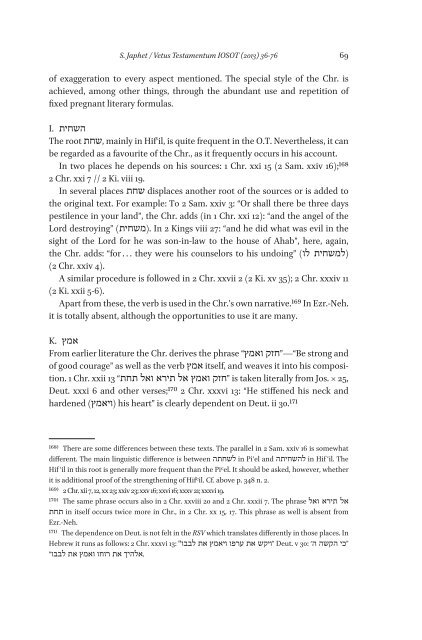Special Issue IOSOT 2013 - Books and Journals
Special Issue IOSOT 2013 - Books and Journals
Special Issue IOSOT 2013 - Books and Journals
You also want an ePaper? Increase the reach of your titles
YUMPU automatically turns print PDFs into web optimized ePapers that Google loves.
S. Japhet / Vetus Testamentum <strong>IOSOT</strong> (<strong>2013</strong>) 36-76 69<br />
of exaggeration to every aspect mentioned. The special style of the Chr. is<br />
achieved, among other things, through the abundant use <strong>and</strong> repetition of<br />
fixed pregnant literary formulas.<br />
השחית .I<br />
The root ,שחת mainly in Hifʿil, is quite frequent in the O.T. Nevertheless, it can<br />
be regarded as a favourite of the Chr., as it frequently occurs in his account.<br />
In two places he depends on his sources: 1 Chr. xxi 15 (2 Sam. xxiv 16);168<br />
2 Chr. xxi 7 // 2 Ki. viii 19.<br />
In several places שחת displaces another root of the sources or is added to<br />
the original text. For example: To 2 Sam. xxiv 3: “Or shall there be three days<br />
pestilence in your l<strong>and</strong>”, the Chr. adds (in 1 Chr. xxi 12): “<strong>and</strong> the angel of the<br />
Lord destroying” .(משחית) In 2 Kings viii 27: “<strong>and</strong> he did what was evil in the<br />
sight of the Lord for he was son-in-law to the house of Ahab”, here, again,<br />
)למשחית לו) undoing” the Chr. adds: “for . . . they were his counselors to his<br />
(2 Chr. xxiv 4).<br />
A similar procedure is followed in 2 Chr. xxvii 2 (2 Ki. xv 35); 2 Chr. xxxiv 11<br />
(2 Ki. xxii 5-6).<br />
Apart from these, the verb is used in the Chr.’s own narrative.169 In Ezr.-Neh.<br />
it is totally absent, although the opportunities to use it are many.<br />
אמץ .K<br />
From earlier literature the Chr. derives the phrase ואמץ“ Be“—”חזק strong <strong>and</strong><br />
of good courage” as well as the verb אמץ itself, <strong>and</strong> weaves it into his composition.<br />
1 Chr. xxii 13 ואמץ אל תירא ואל תחת“ ”חזק is taken literally from Jos. × 25,<br />
Deut. xxxi 6 <strong>and</strong> other verses;170 2 Chr. xxxvi 13: “He stiffened his neck <strong>and</strong><br />
hardened (ויאמץ) his heart” is clearly dependent on Deut. ii 30.171<br />
168) There are some differences between these texts. The parallel in 2 Sam. xxiv 16 is somewhat<br />
different. The main linguistic difference is between לשחתה in Piʿel <strong>and</strong> להשחיתה in Hif ʿil. The<br />
Hif ʿil in this root is generally more frequent than the Piᶜel. It should be asked, however, whether<br />
it is additional proof of the strengthening of Hifᶜil. Cf. above p. 348 n. 2.<br />
169) 2 Chr. xii 7, 12, xx 23; xxiv 23; xxv 16; xxvi 16; xxxv 21; xxxvi 19.<br />
אל תירא ואל 170) The same phrase occurs also in 2 Chr. xxviii 20 <strong>and</strong> 2 Chr. xxxii 7. The phrase<br />
in itself occurs twice more in Chr., in 2 Chr. xx 15, 17. This phrase as well is absent from תחת<br />
Ezr.-Neh.<br />
171) The dependence on Deut. is not felt in the RSV which translates differently in those places. In<br />
“כי הקשה ה׳ 30: Deut. v ”ויקש את ערפו ויאמץ את לבבו” 13: Hebrew it runs as follows: 2 Chr. xxxvi<br />
.אלהיך את רוחו ואמץ את לבבו”








![Am HaSefer [Volk des Buches] - Books and Journals](https://img.yumpu.com/20648352/1/174x260/am-hasefer-volk-des-buches-books-and-journals.jpg?quality=85)







